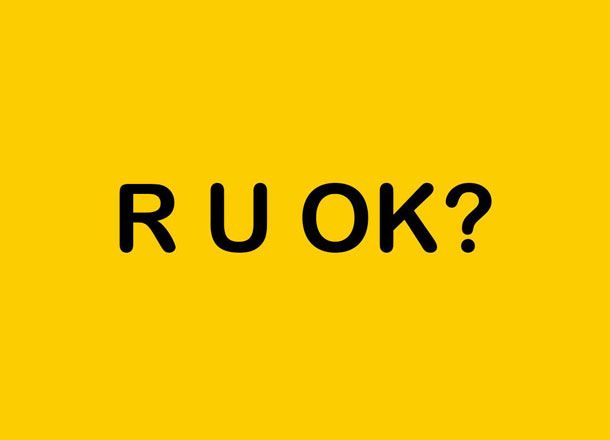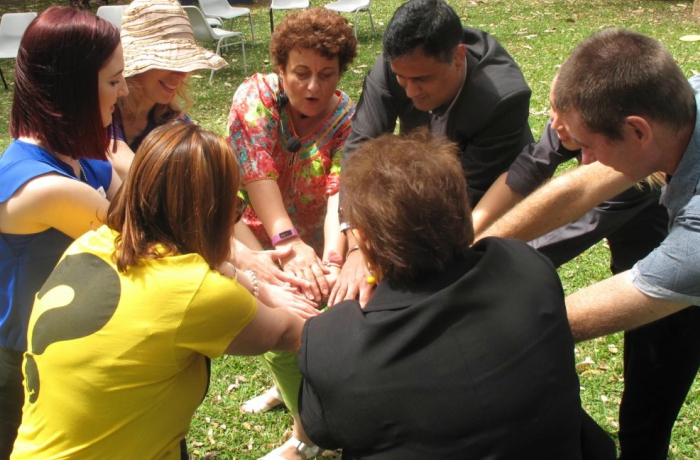
R U OK? Day 2020
Howyagoin’?
It’s a standard Australian welcome, a casual salutation, but do you usually listen to the response?
Next Thursday 10 September, why not change the greeting to ‘Are you okay, mate?’
It doesn’t sound that much different in its formality yet the campaign behind it is life-changing—and your reaction to that the answer could be too,
Thursday 10 September is R U OK? Day. It’s also World Suicide Prevention Day. Whatever you call it, it’s day that reminds us to check in on family, friends and colleagues regularly and raises awareness of suicide prevention.

On R U OK? Day back in 2016, I was in Rockhampton, running laughter yoga sessions with Central Queensland University students, administrative staff and academics, helping them playfully ‘unload’ their stresses and struggles. Look how close we were…oh those were the good ol’ days!
This year, it’s different (of course). Some of us are using technology to telecommute instead of going into the workplace. Some of us have lost our jobs. Some of us live in areas with strict lock-downs and can’t leave home, other than for essential shopping, work, exercise, or medical appointments. Some of us live with less stringent, but still limiting, opportunities to see friends and family. And we’re ALL being told to socially—physically—distance.
Why R U OK? Day is important in 2020
The global health crisis triggered by COVID-19 is something every news organisation is talking about. But what about loneliness, anxiety, depression? The evidence is there: the Australian National University’s survey on alcohol consumption and the International Journal of Social Psychiatry’s article on the impact of loneliness are just two cases in point.
I reckon R U OK? Day has never been more important than in 2020 – although I also believe checking in, genuinely, shouldn’t be relegated to one day a year (neither does the RUOK? organisation).
Maybe a friend or family member has been ‘out of sorts’ lately. Maybe you’ve had a niggling feeling that all is not well with a work colleague, team mate or neighbour. But you don’t want to be thought of as nosey, and if you do ask, and you hear more than the equally typical ‘fine, mate, how’s yourself’, what will you do?
Knowing how to handle the response
The R U OK? website has some great tips on how to get the most from this seemingly simple question—along with equally important self-care. (By the way, you can find self-care inspiration at the Action for Happiness September calendar here).
- Ask
- Listen
- Encourage action
- Check in
Asking ‘Are you okay?—like practising laughter yoga exercises with others —creates connections and acts like opening a pressure valve. Those connections invite meaningful conversations. They can, like laughter yoga, help flick a switch to shine a light where all seemed bleak. They can make people feel safer, cared for and that they matter.
And what will I be doing next Thursday? I’m facilitating video-conference-based laughter yoga sessions for support groups with members all over Queensland, checking in on how they’re going, and giving them some uplift and connection. And I will be reaching out and asking someone I’ve not heard from for a few weeks “Are you okay, mate?”
WORRIED SOMEONE MIGHT BE SUICIDAL? Contact Lifeline 13 11 14 for crisis support. If life is in danger, call triple zero (000).
(c) Heather Joy Campbell 2020
Founder of The Happydemic, Heather Joy Campbell is a Certified Laughter Yoga Teacher based in Brisbane, Australia, who delivers professional laughter wellbeing teambuilding and stress-busting workplace and community workshops, online and in person, as well as training laughter yoga leaders across Queensland.